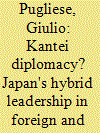| Srl | Item |
| 1 |
ID:
153861


|
|
|
|
|
| Summary/Abstract |
This article discusses how Brazilian foreign policy-makers addressed one of the key graduation dilemmas facing Brazil, i.e. the need to build domestic support for a shared vision within society for Brazil's role in the international arena. In the context of democratization, foreign policy-makers understood the importance of involving societal actors in developing foreign policy agendas and actions without hampering the coherence of diplomatic activity. Furthermore, in the context of the rising profile of Brazil in regional and global affairs, it became increasingly relevant to identify and appreciate the role of domestic influences and constraints on foreign policy-making. The article argues that the years the Workers' Party (PT) was in government (2003–2016) presented a watershed moment for foreign policy-makers' receptiveness to civil society inputs into foreign-policy debates. To do this, the article analyses how one crucial group of societal actors—business—organized to represent its interests on foreign economic policy, specifically trade policy, and how the Itamaraty (Ministry of External Relations) responded to business collective action. It examines business interactions with the Itamaraty in two phases, with the global financial crisis in 2008 roughly serving as the inflection point. It argues that the shift in the PT's foreign policy-making approach occurs due to three factors: changes in economic conditions, political leadership and societal interest representation. It concludes that the shifting policy preferences (both pragmatic and ideological) also changed the mix of societal influence on foreign policy.
|
|
|
|
|
|
|
|
|
|
|
|
|
|
|
|
| 2 |
ID:
151442


|
|
|
|
|
| Summary/Abstract |
This article operationalizes Japanese leadership in foreign and security policy, specifically the Abe administrations’ consistent China balancing. It will do so to dispel instances of Premier-centered diplomacy and posit that Abe's diplomatic agenda has rested on a ‘hybrid’ policy-making authority, where the leverage enjoyed by the Prime Minister's office (the Kantei) rested on little-appreciated politicized personnel appointments and demotions within the bureaucratic apparatus, specifically the Ministry of Foreign Affairs. Moreover, successful Japanese leadership has functioned especially when operating within the scope of the US strategic framework towards East Asia. While structural constraints, such as the ever-present influence of the USA and bureaucratic coordination, may constrain options, effective leadership in foreign policy-making can indeed make a difference within those boundaries.
|
|
|
|
|
|
|
|
|
|
|
|
|
|
|
|
| 3 |
ID:
165141


|
|
|
|
|
| Summary/Abstract |
Russia's growing energy cooperation with China is central to several of Moscow's top foreign-policy objectives. Analyzing what drives Russia's energy diplomacy with China can therefore shed important light on the dynamics of Russian foreign policy-making. We go beyond other recent studies of this topic by examining the role of domestic political influences and the countries’ bilateral interactions. We show that personalist elements influence both Russia's policy-making and its diplomacy with China. The personalism has made it hard for Russia to coordinate the relevant decision-making institutions and get the most from its energy strength. The economic gains from recent energy deals, particularly to Russia's Far East, have been less than expected, and Russia has met only limited success in achieving its foreign-policy priorities in the Asia-Pacific region. Moving forward, Russia must further institutionalize its decision-making process, limit the role of personalism, and better coordinate the activities of its energy firms with the goals of its central agencies and local governments.
|
|
|
|
|
|
|
|
|
|
|
|
|
|
|
|